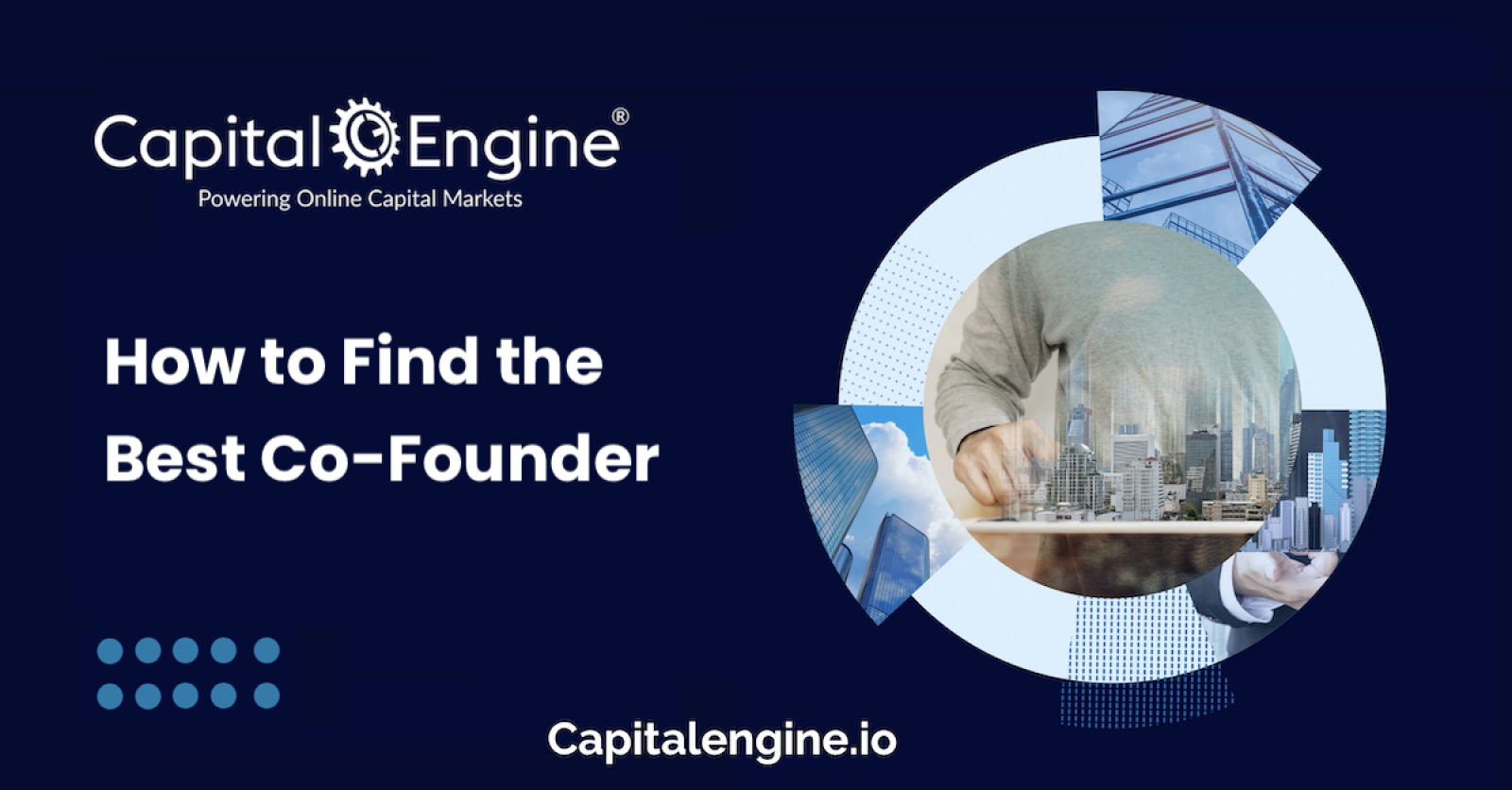Fundraising

How to Find the Best Co-Founder
Finding the right co-founder is arguably the most crucial part of starting a company. Here’s why having a co-founder is essential and how to find the right one.
Why You Need a Co-Founder
1. Increased Productivity: A co-founder allows you to divide tasks and combine complementary skills, leading to better and more efficient work. Brainstorming together can yield better ideas and provide a sounding board to avoid potential pitfalls.
2. Moral Support: Startups are intense and taxing. A co-founder can offer emotional support, balancing each other's highs and lows. They can keep you grounded when you’re overly optimistic and lift you up when you’re down.
3. Pattern Matching to Success: Historically, successful startups like Apple, Facebook, Google, and Microsoft started with co-founders. While the CEOs of these companies often become the public faces, they initially relied on co-founders for support and collaboration.
Should You Wait for a Co-Founder?
While it's generally advisable to wait for a great co-founder, there are exceptions. Single founders with high conviction in their idea and the ability to make significant progress on their own can succeed. Typically, these founders are technical and can build the first version of their product themselves. An example is Drew Houston of Dropbox, who initially started alone but found a co-founder before receiving funding.
What to Look for in a Co-Founder
1. Stress Management: The most critical trait in a co-founder is how they handle stress. Startups are stressful, and a good co-founder should help you manage that stress. They should be someone you know well enough to predict their behavior under pressure.
2. Aligned Goals and Values: Ensure that your co-founder shares your vision for the company. Conflicting goals can lead to inevitable conflict. For instance, if one wants to build a high-growth company and the other prefers a slow, steady approach, it won’t work. Have an honest conversation about motivations and ambitions.
3. Complementary Skills: Ideally, your co-founder should have skills that complement yours. If you're good at sales, find someone great at building the product. However, don’t overly fixate on finding a perfect skills match. More important is mutual trust and enjoyment of working together. Skills gaps can be filled by hiring as the company grows.
Testing a Potential Co-Founder
Before committing, allocate time to work together on a project. Set a deadline to build an MVP or prototype and pitch to customers. This trial period will help you both determine if you enjoy working together.
Key Agreements
1. Equity Split: The default should be a 50/50 split to ensure equal motivation and commitment. If one person has already made significant progress, adjust accordingly but prioritize long-term motivation and fairness.
2. CEO Role: Decide early on who will be the CEO. The title won’t affect day-to-day responsibilities much in the early stages, but clarity on this role is important for long-term decision-making.
Here are some steps to help you find the best co-founder:
1. Self-Assessment: Know What You Need
8. Trust Your Instincts
Finding the right co-founder is a combination of strategic searching, thorough evaluation, and personal chemistry. Taking the time to find the right person will pay off significantly in the long run.
About Capital Engine®
Capital Engine® provides forward-thinking organizations with efficient and scalable private capital and investor management solutions, for both traditional and digital assets.
Built for high-performance capital raising, our technology helps leverage the opportunity to better originate and showcase a diverse selection of private investment deals and offer these to investors i.e. a deal’s potential viability can be better assessed, market appetite determined and transaction promptly closed.
Our clients include broker dealers, family offices, wealth managers, incubators, accelerators, social impact and real estate funds, in providing customized SaaS solutions to power private capital and alternative investment platforms, with a strong focus on investor management services.
Interested in raising capital
Request a Call / Demo
Finding the right co-founder is arguably the most crucial part of starting a company. Here’s why having a co-founder is essential and how to find the right one.
Why You Need a Co-Founder
1. Increased Productivity: A co-founder allows you to divide tasks and combine complementary skills, leading to better and more efficient work. Brainstorming together can yield better ideas and provide a sounding board to avoid potential pitfalls.
2. Moral Support: Startups are intense and taxing. A co-founder can offer emotional support, balancing each other's highs and lows. They can keep you grounded when you’re overly optimistic and lift you up when you’re down.
3. Pattern Matching to Success: Historically, successful startups like Apple, Facebook, Google, and Microsoft started with co-founders. While the CEOs of these companies often become the public faces, they initially relied on co-founders for support and collaboration.
Should You Wait for a Co-Founder?
While it's generally advisable to wait for a great co-founder, there are exceptions. Single founders with high conviction in their idea and the ability to make significant progress on their own can succeed. Typically, these founders are technical and can build the first version of their product themselves. An example is Drew Houston of Dropbox, who initially started alone but found a co-founder before receiving funding.
What to Look for in a Co-Founder
1. Stress Management: The most critical trait in a co-founder is how they handle stress. Startups are stressful, and a good co-founder should help you manage that stress. They should be someone you know well enough to predict their behavior under pressure.
2. Aligned Goals and Values: Ensure that your co-founder shares your vision for the company. Conflicting goals can lead to inevitable conflict. For instance, if one wants to build a high-growth company and the other prefers a slow, steady approach, it won’t work. Have an honest conversation about motivations and ambitions.
3. Complementary Skills: Ideally, your co-founder should have skills that complement yours. If you're good at sales, find someone great at building the product. However, don’t overly fixate on finding a perfect skills match. More important is mutual trust and enjoyment of working together. Skills gaps can be filled by hiring as the company grows.
Testing a Potential Co-Founder
Before committing, allocate time to work together on a project. Set a deadline to build an MVP or prototype and pitch to customers. This trial period will help you both determine if you enjoy working together.
Key Agreements
1. Equity Split: The default should be a 50/50 split to ensure equal motivation and commitment. If one person has already made significant progress, adjust accordingly but prioritize long-term motivation and fairness.
2. CEO Role: Decide early on who will be the CEO. The title won’t affect day-to-day responsibilities much in the early stages, but clarity on this role is important for long-term decision-making.
Here are some steps to help you find the best co-founder:
1. Self-Assessment: Know What You Need
- Skills and Expertise: Identify the skills and expertise you lack that are crucial for your startup.
- Values and Vision: Ensure your co-founder shares your core values and vision for the company.
- Work Style and Commitment: Find someone with a compatible work style and level of commitment.
- Professional Network: Reach out to your professional contacts and attend industry events.
- Friends and Family: Sometimes, the best candidates are those you already know well.
- Alumni Networks: Utilize your school or university alumni networks.
- Incubators and Accelerators: Join programs that can connect you with potential co-founders.
- Meetup Groups: Attend local startup or tech meetups.
- Online Communities: Participate in forums and platforms like Y Combinator’s Startup School, Indie Hackers, or CoFoundersLab.
- LinkedIn: Use LinkedIn to search for people with the skills and experience you need.
- Twitter: Engage with the startup community on Twitter.
- AngelList: Explore AngelList to find potential co-founders in the startup ecosystem.
- Technical and Business Skills: Ensure they complement your skill set.
- References and Background Check: Talk to their previous colleagues or partners.
- Trial Period: Consider working on a small project together before committing.
- Equity and Roles: Have clear discussions about equity split and roles.
- Decision-Making Process: Agree on how decisions will be made and what happens in case of disputes.
- Exit Strategy: Discuss the long-term vision and potential exit strategies.
- Co-Founder Agreement: Draft a co-founder agreement outlining roles, responsibilities, equity, and conflict resolution.
- Legal Advice: Consult with a lawyer to ensure everything is properly documented.
8. Trust Your Instincts
- Cultural Fit: Ensure there’s a cultural and personal fit.
- Gut Feeling: Trust your instincts about the person’s reliability and compatibility.
Finding the right co-founder is a combination of strategic searching, thorough evaluation, and personal chemistry. Taking the time to find the right person will pay off significantly in the long run.
About Capital Engine®
Capital Engine® provides forward-thinking organizations with efficient and scalable private capital and investor management solutions, for both traditional and digital assets.
Built for high-performance capital raising, our technology helps leverage the opportunity to better originate and showcase a diverse selection of private investment deals and offer these to investors i.e. a deal’s potential viability can be better assessed, market appetite determined and transaction promptly closed.
Our clients include broker dealers, family offices, wealth managers, incubators, accelerators, social impact and real estate funds, in providing customized SaaS solutions to power private capital and alternative investment platforms, with a strong focus on investor management services.
Interested in raising capital
Request a Call / Demo
Latest Articles





